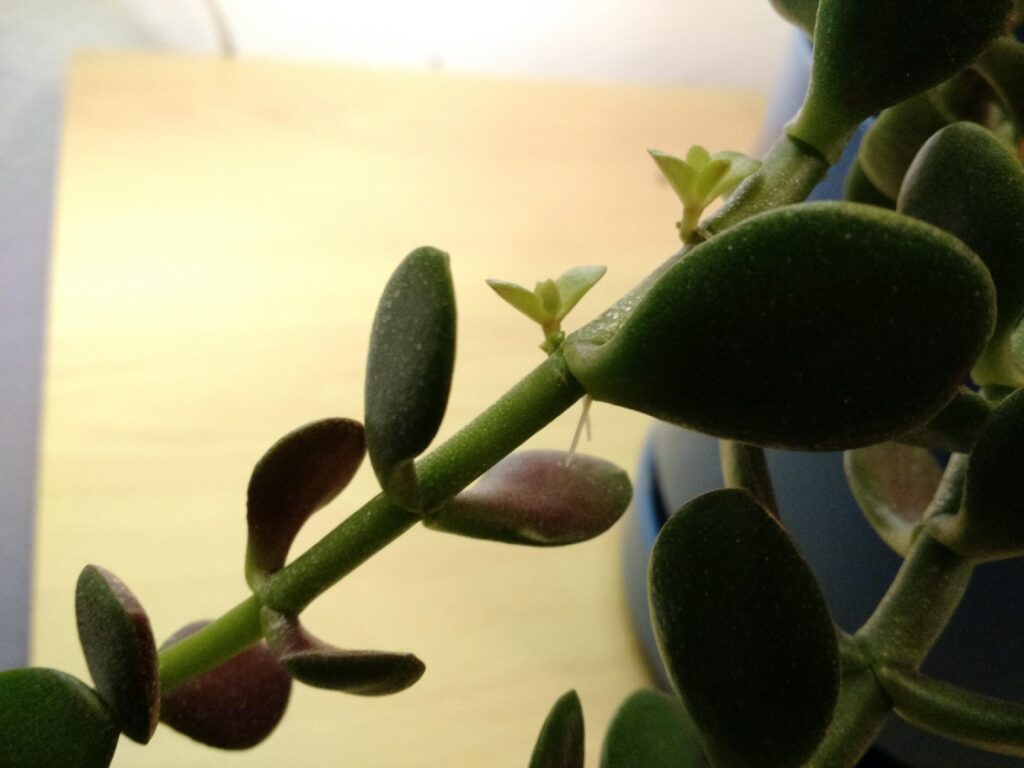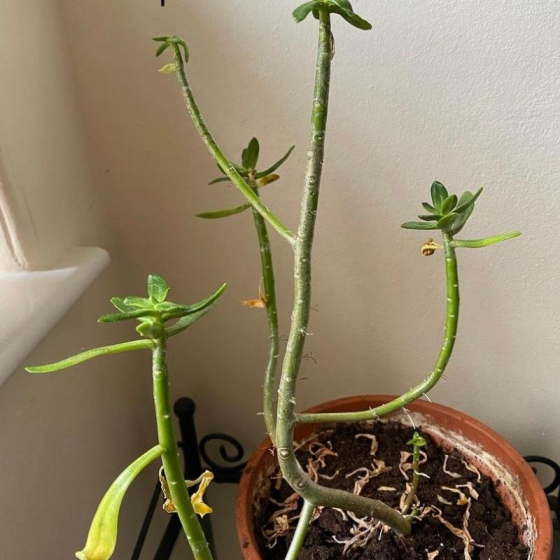
“My jade plant has roots growing out from the stems l”- this question commonly pops up on our site and I thought as many of you are facing this issue I should write about it in detail.
I think people who are concerned about it are new to the concept of aerial root and new to succulents because this is a common sight for succulent owners. However, even though it’s common doesn’t mean it’s a normal sign. It’s in fact an early sign of the mistakes you are creating constantly while caring for them. The good news is that it is generally easy to rectify.
In this article, we will talk about what aerial roots are. Why do jade plants grow aerial roots suddenly? and also what to do to get rid of it.
What are aerial roots?
Aerial roots are roots that grow above the soil. They are thinner and more delicate than normal roots that grow in the soil. The roots are pink or white in colour and eventually turn yellow or brown before falling off like a leaf. Different types of trees grow different kinds of aerial roots. For some trees, they are not concerning but unfortunately for jade plants it is. It’s a way your plant is telling you that something is not right.
It’s an early sign for help but they themselves don’t hurt the tree, in fact they help the tree for many different factors, like;
- It helps your jade plants to absorb moisture and nutrients from the air.
- Sometimes they grow downwards and anchor with the soil and create a support system for your jade plant’s weak stems.
- Aerial roots have small pores that help the plant to take as much air as the plant needs, this happens when the plant is particularly waterlogged.
- These roots on the stems can make the cutting propagation method much easier, which I will discuss later in the article.
Now let’s learn why this happens;
What causes jade plants to form roots on their stems?
You might get overwhelmed by the sight of your jade plants producing roots on their stems, but here are some reasons that might be behind it-
1. Underwatering:

Underwatering is the most common issue for your jade plants to grow aerial roots. When your plant lacks moisture in the soil they desperately grow roots in their stems to absorb it from the air.
You can determine underwater issues in two ways. First, use your fingers and insert them in the soil. If it feels bone dry on the undersurface of the soil it indicates that it is under watered. But jade plants know how to survive without water for days so it’s hard to tell if water is really the issue. For that, you can check out the plant properly, because they will turn soft and wrinkled if you go overboard while underwater.
The best solution in this position would be to place the pot in the sink, turn the tap and give them a good bath. Let the water run through the soil and rinse out from the drainage holes. Keep the pot in the sink till all the excess water is out from the drainage hole and then place the pot in its usual position. You will see your plant lively again after repeating the process a few times.
2. High temperature:
Jade plants are hardy with harsh temperatures, but when the temperature goes from low to high quickly they might feel threatened by the situation and will grow extra roots as a precautionary measure. The ideal temperature for jade plants is 18 to 34 degrees Celsius.
Constant low temperatures will show symptoms like wilting or collapsing but it will not produce aerial roots.
3. Lack of light:
This one mainly happens for indoor jade plants growers. Jade plants love bright and indirect sunlight. If you fail to provide it for a longer period of time it will start to etiolate, meaning it will grow longer and lankier in the hope of reaching towards light. Meantime they can also produce aerial roots.
To fix that issue you need to reposition your plant or you have to install some grow light to provide it. But in this case, you have to make sure you are not giving your plant a shock, or else they will produce more aerial roots as a precautionary measure. You should introduce to its new position gradually.
I have noticed that your tree will be happy and healthy in its new position if you give it enough time to adjust.
4. Stress:
Plants are accustomed to gradual changes in their surroundings. So if as a gardener you move things around them too fast it will face trauma or stress.
Trauma in jade plants mainly happens due to some kind of changes. For example, changing the watering routine all of sudden, positioning the plant in relatively opposite circumstances, and temperature fluctuations.
In all these cases your plant will grow aerial roots as a protector.
During repositioning your plant can receive a wound and in this case, they will grow aerial roots in that plant as a security measure.
5. Nutrient deficiency:
It’s easy to neglect your jade plants as you know they are hardy plants, but in this process, you might end up failing to provide the basic needs for your jade plant.
Your jade plants will need some kind of nutrients especially if they are growing as indoor plants. When they are overlooked for this they will produce aerial roots as a sign that it needs repotting or feeding.
If the plant is etiolated and there are no signs of lack of light or underwatering your plant needs to be re-potted immediately. Use well-draining soil. You can use soil that is made for cactus.
Feed them with all-purpose liquid fertilizer ( preferably 2-8-8 NPK) once every two months. Increase the amount in the growing season to once every six weeks.
How To Remove Aerial Roots From Jade Plants?
Aerial roots will induce no damage to your Jade Plant, so it is totally fine to keep them. The primary reason for getting rid of them is that they are unappealing from a decorative perspective especially when they grow more and more in numbers.
As they are helping with no real purpose after you fix the real issue there is no reason why you shouldn’t remove them, and the removal process also will not damage your plant in any way.
You can just prune them off near the stem with a pair of sharp scissors or a blade but be cautious not to slash into the flesh of the stem.
Propagating Jade Plants Cuttings with Aerial Roots?
Aerial roots do not have the DNA required to propagate new plants in the exact way that root cuttings do.
By growing this cutting into regular potting soil, you would be reasonably certain of achieving a thriving new plant.
I would warn against doing this, however. Remember that these aerial roots are an indication that your plant is stressed.
It is fairly easy to get cuttings to take from a Jade Plant. Very often when one of mine drops a leaf, all I have to do is place it on some soil and it will put down roots and start developing with no additional help from me.
You should instead wait and take cuttings when the plant is back in a healthy state rather than further weaken it by taking cuttings when there are aerial roots.
If you want to reproduce more plants, you should look into other propagation methods.
However, I will advise you to wait until your Jade Plant has healed and revived to its full health before attempting to take cuttings.
Now that you know that the aerial roots are not a sign to be panicked you can relieve now. But keep in mind that your plant is going through something and it is the early indication of something big, so take care of your plant and provide what is lacking, I am sure your tree will appreciate it.
